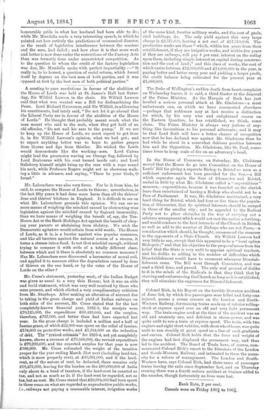In the House of Commons, on Saturday, Mr. Gladstone moved
that the House do go into Committee on the House of Lords' Bill for giving a separate Bishop to Bristol so soon as a sufficient endowment has been provided for the See,—a Bill which separates again the Sees of Gloucester and Bristol, united in 1836 by what Mr. Gladstone called a " superstitious " measure,—superstitious, because it was founded on the slavish fears then entertained of having a Bishop who should not be a Peer of Parliament. It was, Mr. Gladstone maintained, a very hard thing for Bristol, which had four or five times the popula- tion of Gloucester, that its spiritual interests should be merged in those of the smaller city ; and he appealed to the Radical Party not to place obstacles in the way of carrying out a salutary arrangement which would not cost the nation a farthing, and would conduce to the best interests of the Church in Bristol, as well as add to the number of Bishops who are not Peers,—a consideration which should, he thought, recommend the measure to the opponents of a State Church. Sir Wilfrid Lawson had very little to say, except that this appeared to be a " local option Bishopric ;" and that his objection to the proposal arose from his belief that the State is very unfit to appoint spiritual teachers, and his dislike to adding to the number of difficulties which Disestablishment would have to surmount whenever Disestab- lishment came. The Bill went through Committee, and was read a third time, and passed. The only real ground of dislike to it in the minds of the Radicals is that they think that by starving and embarrassing the Church so long as it is established, they will stimulate the eagerness for Disestablishment.


































 Previous page
Previous page